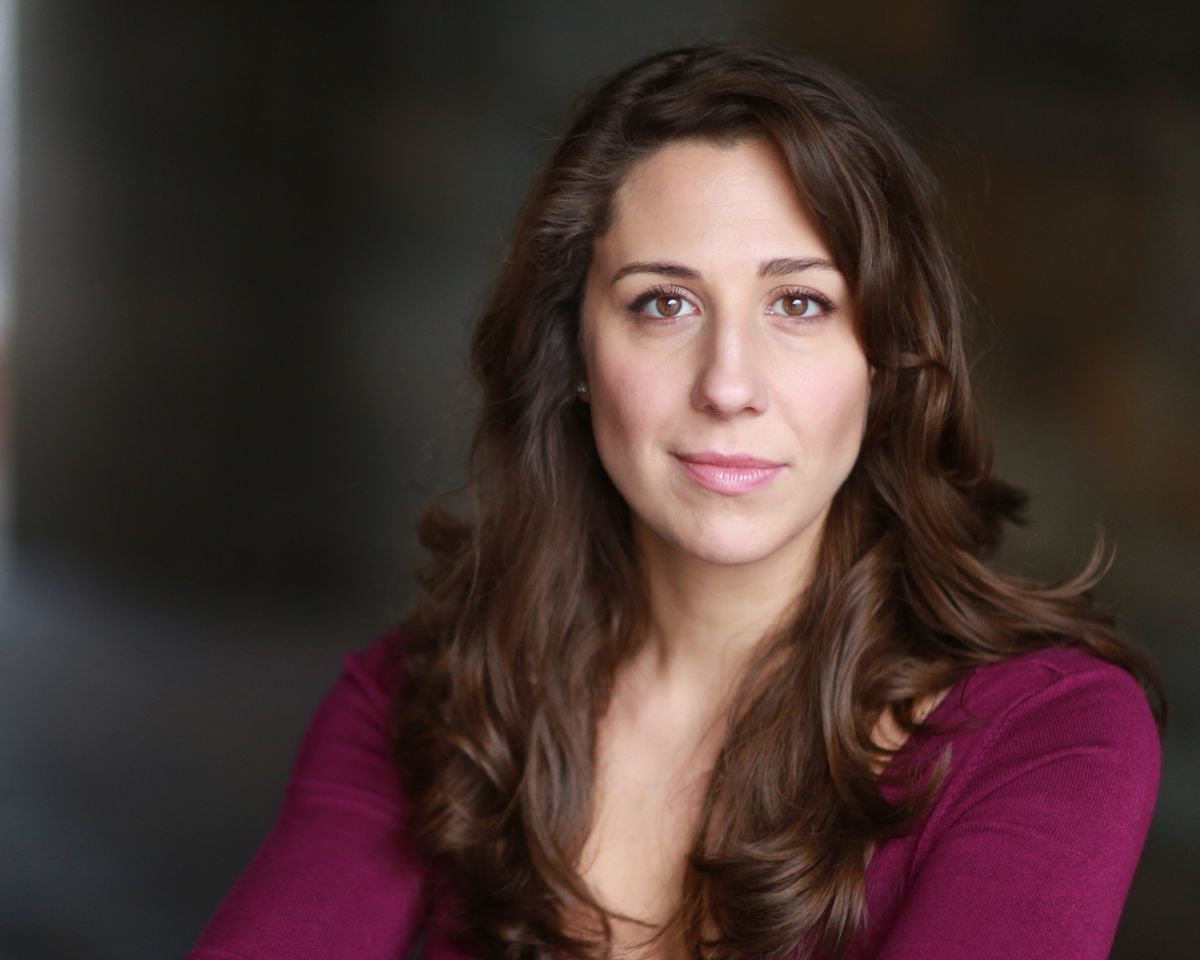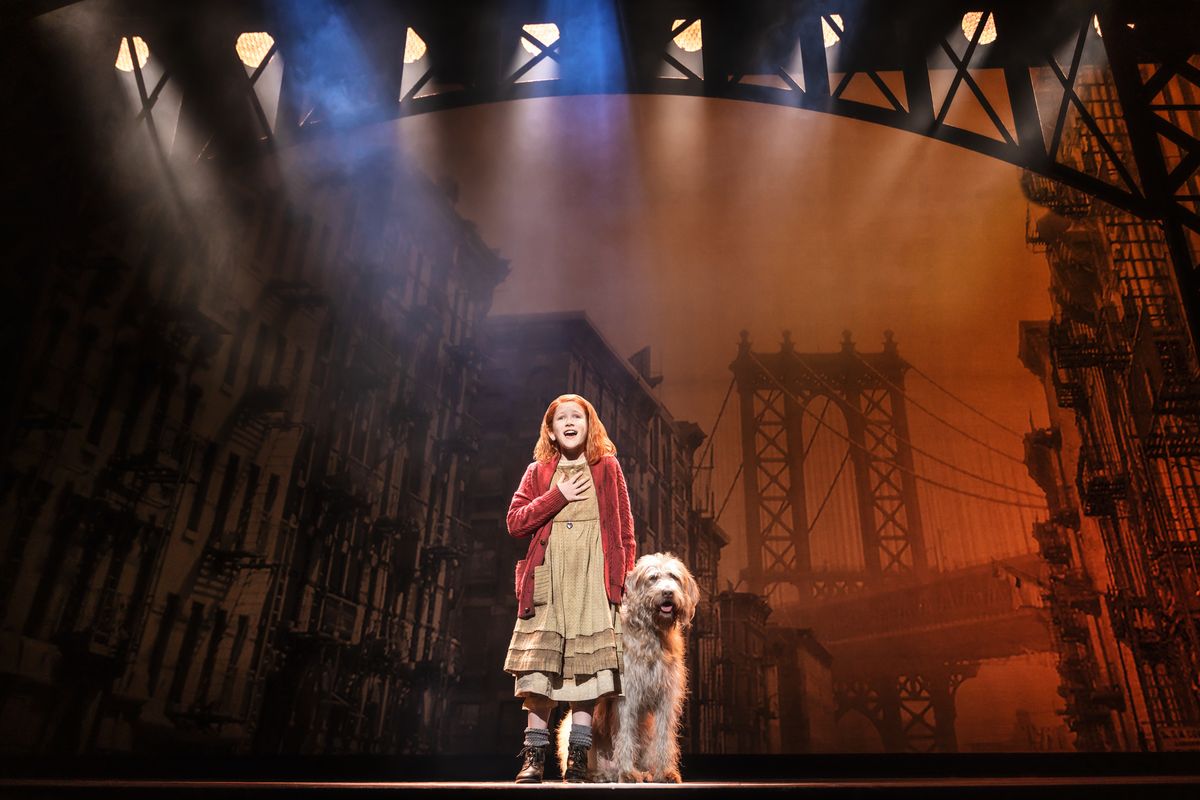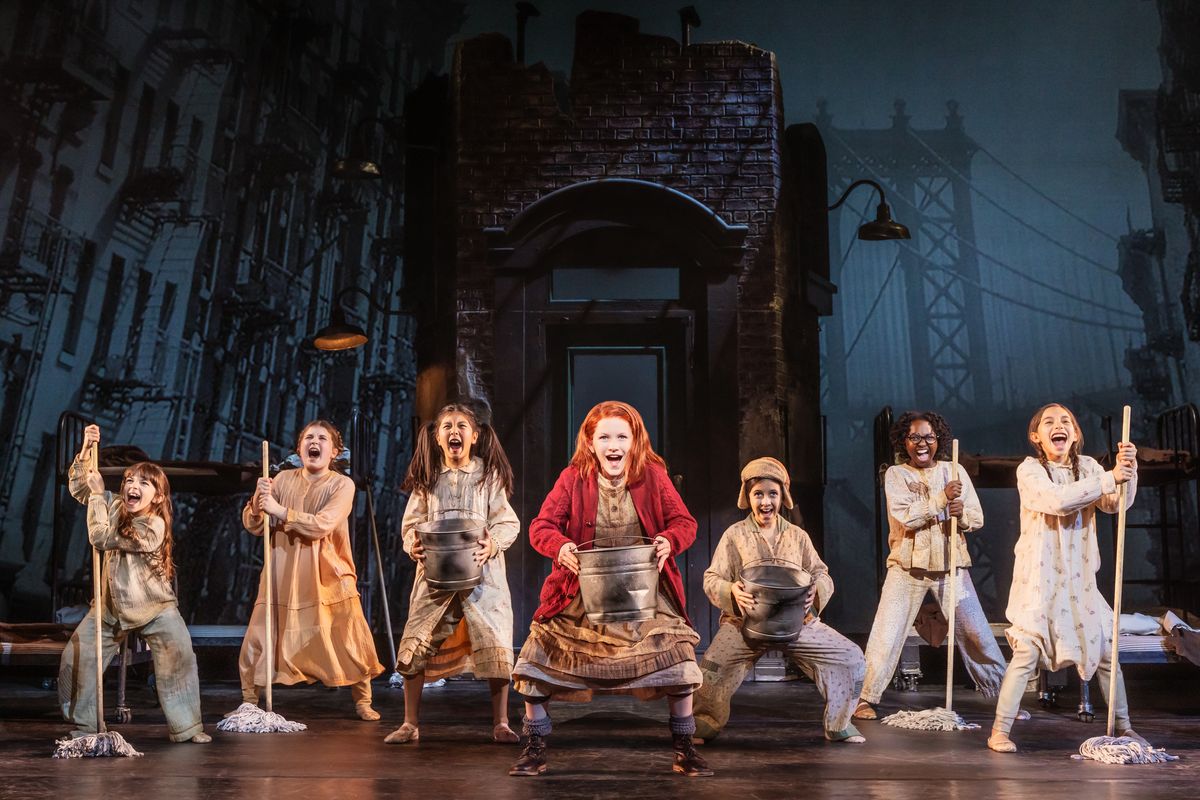Touring Broadway actor Stefanie Londino, playing Miss Hannigan in ‘Annie,’ talks on female plot drivers, love versus apathy and her ‘chickens’
Hazel Vogel, as Annie in center, and the orphans sing and dance during the national tour of “Annie,” coming this weekend to the First Interstate Center for the Arts. (Matthew Murphy/MurphyMade)
Singer and actor Stefanie Londino’s first time performing in a full musical was a production of “Gypsy” at a local high school. Eight years old at the time, Londino and other elementary school students had been brought in to play newsboys.
Londino was so excited to be there, she shouted herself hoarse before the show opened and had laryngitis by opening night.
“Boy, did I have a good time,” she said with a laugh.
Now a seasoned performer, Londino has a much better pre-show vocal warmup, which comes in handy when she’s shouting at a group of orphans night after night as Miss Hannigan in the national tour of “Annie.” The musical plays for four performances this weekend at the First Interstate Center for the Arts.
“Annie” opens at an orphanage in New York City with the title character (Hazel Vogel) comforting Molly (Olive Ross-Kline) after the latter had a bad dream. Annie has spent all of her young life in the orphanage, having been dropped off as a baby. Even still, she holds onto hope that her parents will return and take her home with them.
Feeling bold, Annie decides to escape from the orphanage to find her parents but is quickly caught by Miss Hannigan (Londino), the head of the orphanage. As punishment, Miss Hannigan forces the girls – Annie, Molly, Pepper (Aria Valentina Aldea), Kate (Eva Lizette Carreon), July (Anna Dillon), Tessie (Kylie Noelle Patterson) and Duffy (Nora West) – to clean the orphanage.
The clever Annie is able to successfully escape later on after hiding in the blankets picked up by the laundry man. Miss Hannigan soon realizes Annie has disappeared again and tries to find her.
Annie befriends a stray dog she names Sandy (Kevin, a 7-year-old labradoodle) and wanders into Hooverville, a place where people left homeless by the Great Depression live. After police officers break up the camp, they return Annie to the orphanage, where she is once again punished with extra chores.
Grace Farrell (Julia Nicole Hunter), the assistant to billionaire Oliver Warbucks (Christopher Swan), then visits the orphanage in search of a child to spend Christmas at Warbucks’s mansion. Seeing how Miss Hannigan has overloaded Annie with chores, Grace takes her home.
Though he initially assumed all orphans were boys, Warbucks soon takes to Annie and decides to show her the highlights of New York City himself. Grace returns to the orphanage and tells Miss Hannigan that Warbucks wants to adopt Annie.
Meanwhile, after learning that Annie still has hope that her parents will return for her, Warbucks calls in the FBI and promises to find her parents, going so far as to offer a $50,000 award to the couple who can prove they’re Annie’s parents.
When Miss Hannigan vents her frustration over Annie’s potential adoption to her brother Rooster (Rhett Guter) and his girlfriend Lily St. Regis (Isabella de Souza Moore), the trio realize they can make the situation work in their favor.
The cast includes Mark Woodard, Nick Abbott, Anthony DaSilva, Savannah Fisher, Matt Gibson, Alloria Frayser, Caroline Glazier, Danny Lindgren, Melinda Parrett, Drew Tanabe, Brooke Olivia Gatto, Ryan Mulvaney and Stephanie Wahl. Cooper, a 3-year-old rescue mix, is the Sandy understudy.
“Annie” features a book by Thomas Meehan, music by Charles Strouse and lyrics by Martin Charnin. It’s based on the comic strip “Little Orphan Annie” by Harold Gray, which itself was inspired by James Whitcomb Riley’s poem “Little Orphant Annie.”
This tour marks Londino’s third season as Miss Hannigan, a role she has now performed more than 550 times. Londino was drawn to the role because of how different Miss Hannigan is to most female characters in Golden Age musicals.
“In the Golden Agers all the way up through before the turn of the last century, we weren’t writing female characters that were plot drivers,” she said. “Usually female characters, especially in the Golden Age musicals, are side pieces to add depth to male characters or incidental … But Hannigan has depth, she has drive. She’s trying to escape her miserable life that she hates, and she’s willing to go to quite extraordinary lengths to do so.”
Miss Hannigan’s plight is something Londino said many modern audiences can relate to, a time when no one feels like they’ve got enough to survive and when many are hoping for bipartisanship within the government.
“I get asked all the time, ‘Why “Annie?” We’ve been watching “Annie” for almost 50 years,’ ” she said. “There’s still so much in it that resonates directly to today.”
Londino said those who have played Miss Hannigan over those nearly 50 years, including Dorothy Loudon, who originated the role on Broadway, and Carol Burnett, who starred in the 1982 film adaptation, leave big shoes to fill, but in her time with the show, she’s found that rather than leave her own mark on the character, Miss Hannigan has left a mark on her.
“To be able to get to take a performance like this for this long and really get to know her is an extraordinary gift, which I feel grateful for every day,” she said. “Definitely it has grown over time. I had a strong sense of her from the beginning, which I feel really loving toward and protective of, and it has deepened over the course of time and under some beautiful direction.”
Unlike Miss Hannigan, Londino is also protective of the young performers in the show, affectionately calling them “my chickens.” Each time a new batch of “chickens” joins the cast, Londino tells them the show requires moments that should be scary for the audience, not for the actors. If at any point something feels unsafe for the performers, they’re to let her know so they can rework the scene.
Though she has so much love for the girls, Londino has an easier time playing the cruel Miss Hannigan than you might think, because she believes the opposite of love isn’t hatred but apathy.
“In order to hate something with an extraordinary power, you have to care,” she said. “You have to love it on some level, so I feel like it’s an easy step from love to hate, whereas from love to apathy would be a further jump.
“There is no apathy at all in me about those girls. I love those girls.”


